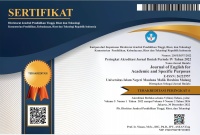IMPROVING STUDENTS’ WRITING SKILLS USING COOPERATIVE LEARNING AT SMPN 2 SUKODONO
Abstract
This research was conducted in order to find out whether using Cooperative Learning is effective to improve students’ writing skills or not. Also, it is to find the result of the students’ ability in writing when the researcher using Cooperative Learning. The main problems were: (1) the students seldom do the writing tasks; (2) they had difficulty in grammar during writing; (3) they got difficulty in developing ideas. The research methodology of this research was Classroom Action Research (CAR), which was done in two cycles. Every cycle consists of four steps, that is planning, implementing, observing, and reflecting. The techniques for collecting the data were documentation, observation and test. The subject of this research is class VII-H that consists of 33 students, one English teacher as a collaborator and the researcher herself involved in this research. Based on the results of the study, it showed that the mean score of students increased from 62.9 to 74.7 in cycle 1. On the other hand, in cycle 2, the mean score increased classically from 76.7 to 83.5. Considering the data above, the achievement of the students in writing skills has achieved the indicator of success using cooperative learning. From the result, the researcher concluded that applying cooperative learning can improve writing skills for seventh grade of SMPN 2 Sukodono.
Keywords: classroom action research, writing skills, cooperative learning
Full Text:
PDFReferences
Brown, H. D. (2001). Teaching by Principles: An Interactive Approach to Language Pedagogy, 2nd. New York: Longman.
Charles, C. M. & Charles, M. G. (2004). Classroom Management for Middle-Grades Teachers. Cambridge: Pearson Education Inc.
Felder, R.M. and Brent, R. (2007) Cooperative Learning: Active Learning: Models from the Analytical Sciences, Washington, DC: American.
Harries, J. (1993). Introducing Writing. London: Penguin English.
Harmer, J. (2003). The Practice of English Language Teaching, 3ed. Essex: Pearson Education Limited.
Hyland, K. (2003). Second Language Writing. Cambridge: Cambridge University Press.
Johnson, D.W., & Johnson, R,T. (n.d.). Introduction to Cooperative Learning. Retrieved from http://www.co- operation.org/?page_id=65 on September 5th, 2019.
Kagan, S. (1994). Cooperative Learning. San Clemente, CA : Kagan Publication.
Lie, A. (2002). Cooperative Learning: Mempraktikkan Cooperative Learning di Ruang-Ruang Kelas. Jakarta: Grasindo.
Lyman, L. & Harvey, F. (2010). Cooperative Learning and Children. Retrieved from http://ericae.net/db/edo/ED306003.htm on September 12th, 2019.
Male, M. (1994). Cooperative Learning and Computers. In S. Sharan (Ed.). Handbook of Cooperative Learning Methods. (pp.267-280). Westport: Greenwood Press.
Orlich, D. C. (2007). Teaching Strategis. New York: Houghton Mifflin Company.
Richards, J.C., & Renandya, W.A. (2002). Methodology in Language Teaching. Cambridge: Cambridge University Press.
Slavin, R. E. (2000). Cooperative Learning: Theory, Research and Practice. Boston: Allyn and Bacon.
Spratt, M., Pulverness, A., & Melanie, W. (2005). The Teaching Knowledge Test Course. Cambridge: Cambridge University Press.
DOI: https://doi.org/10.18860/jeasp.v2i2.7853
Refbacks
- There are currently no refbacks.





Editorial Office:
Pusat Pengembangan Bahasa
Program Khusus Pengembangan Bahasa Inggris (PKPBI)
Universitas Islam Negeri Maulana Malik Ibrahim Malang
Gedung C lantai 1
Jl. Gajayana No 50 Kota Malang, Jawa Timur, Indonesia
Kode Pos 65144, Telp/Fax : (0341) 570872
Email: jeasp@uin-malang.ac.id







